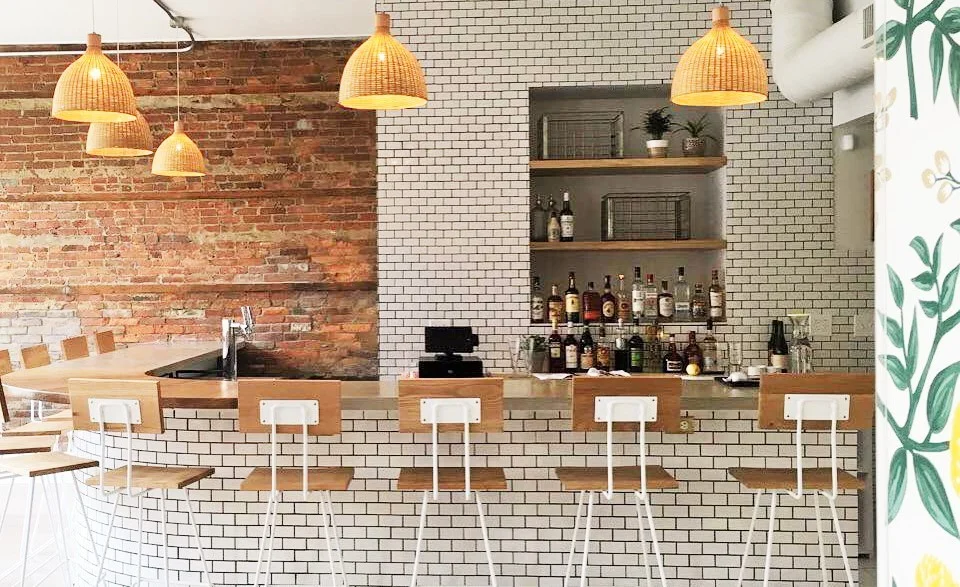As Clevelanders, we are lucky to have a dedicated group of professionals here that work hard to build and promote a better food system. The Plum is one local business that is doing just that, and Chef Brett Sawyer is the driving force behind the mission. He opened The Plum with partner Jonah Oryszak in 2016, and his dedication to supporting local farms and reducing food waste is nothing short of impressive.
Here’s the lowdown on Brett’s journey: He spent some time in college, both at Ohio State and the University of Akron, often not attending class (we’ve all been there) and working at restaurants in various front-of-the-house positions. He eventually moved to France, where, not surprisingly, he became more interested in cooking. After returning home from France, Brett was contemplating a career as a chef. He moved back to Akron and worked as a bartender at Chrissie Hynde’s former restaurant VegiTerranean, but ultimately Brett had his eyes set on the kitchen. Then low and behold, one day a line cook job opened up and he took it. From that moment on Brett’s love for cooking was solidified.
After working as a line cook at a few spots around Akron, Brett decided to move to Chicago, and it was there that he got into working with local farms. “It was very much the beginning of places like Chicago, New York, San Francisco getting into the locavore and sustainable movements. The first place I worked in Chicago was called Three Aces, and I was one of the opening line cooks. It was the first place I ever worked that we were using local farms for most of our meat, produce, cheeses and charcuterie. Everything was completely hand made in house, I mean everything. It was a very big deal for me because I had never seen anything like that.”
After three years in Chicago, Brett came back to Cleveland with a vision to eventually open his own place. He worked at the Greenhouse Tavern and Trentina while working on his concept and began building relationships with farmers in the region. “When I was working for [Jonathan] Sawyer, he was a big proponent of local farms and sustainability. Composting was a huge thing and that was really where I learned about it. So when we opened The Plum, we knew we were definitely gonna compost. I mean, why wouldn’t we?”
When we opened The Plum, we knew we were definitely gonna compost. I mean, why wouldn’t we? - Brett Sawyer
That last statement says it all. It’s a philosophy Brett is carrying over to a new concept he’s about to launch, but we’ll get to that in a minute. Brett takes this ethos to heart because it’s simply second nature to him, and it’s precisely why he chose to work with Rust Belt Riders. “They’re great people. Not only are we stoked to be working with them, but they do a great job of keeping up with everything, they’re always on top of it.”
Often we assume that restaurants prioritize sourcing from local farms and incorporating sustainable practices like composting and reducing food waste because it’s a good thing to do. While that’s absolutely true, it’s not the only reason. “We don’t de-stem herbs, the whole herb goes right into the dish. We use the leaves and tops of vegetables as much as we can by incorporating them into purees and mixing them into our salad greens. So the whole vegetable is a very important aspect, not just from a sustainability perspective, but from a cost perspective. If we’re paying by the pound for something, and we’re throwing away a half of it because it’s excess, then we’re literally throwing money into the trash. So it’s important to us to use as much of the vegetable as we possibly can.”
It’s important to us to use as much of the vegetable as we possibly can - Brett Sawyer
As consumers and food lovers that are concerned about climate change, many of us make it a priority to support businesses that build their operation on sustainable practices. It’s our way of voting with our dollars, and it’s a crucial piece of the puzzle. But in the grand scheme of things, supporting those businesses is just one step in the process. Ultimately if we want to make an impact, we have to learn from their example and implement those practices at home by making it a part of our daily lives. We’re lucky to have chefs like Brett who show us that reducing food waste and supporting local farms is totally possible, and most importantly, that it’s not hard.
Ok, enough preaching. Remember that new concept I mentioned…..Brett and the rest of the gang are set to open up a new spot in mid-January. The new Battery Park location is called Good Company and will be more of a modern, hip sports bar with a menu reflects the concept. Think burgers, fries, wings, potato skins, and all that but with plenty of vegan and vegetarian options too.
Good Company Interior
“We're using Certified Angus Beef for steaks and our burger grind. We actually went to Wooster and spent seven hours grinding in different cuts of meat to come up with a signature grind for our restaurant, so nobody else will have this burger. All that meat will come from Boliantz in Ashland. The vegetarian option will be a mushroom terrine that we'll slice into patties and we’ll have a vegan version of our burger too. We're also making chicken patties in house, and we're gonna do our own housemade vegan chickpea patties. So food wise it will be what you know of a sports bar, but we'll have a lot more options for vegetarians and vegans.”
While Good Company’s menu won’t be quite as seasonal as The Plum’s, Brett is still emphasizing locally sourced ingredients when possible and incorporating sustainability practices and composting into the operation. “It's what we believe in, creating as less of a carbon footprint as much as we possibly can. If we're still bringing in imported foods in the winter time and we're still getting vegetables and fruit from other states, to us we should at least be composting and lessening our carbon footprint if we can't order as much locally.”




